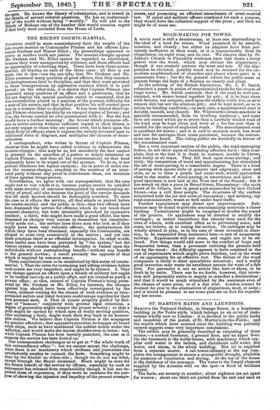THE RECENT COURTS-MARTIAL.
NOTHING could be more unsatisfactory than the results of the late courts-martial on Commander Pitman and his officers Lieu- tenant Graham and Master Elliot ; the proceedings appeared to arrive at neither truth nor justice. The counter-charges against Mr. Graham and Mr. Elliot cannot be regarded as established, because they were unsupported by evidence, and those officers had no opportunity of rebutting them. There have been three courts- martial, all bearing on each of the three cases : all that is yet made out is this—one the one side, that Mr. Graham and Mr. Elliot possessed many qualities of good officers, that they commit- ted transgressions fatal to discipline, and that they were provoked to those transgressions by oppressive conduct which is in part proved; on the other side, it is shown that Captain Pitman also possessed many qualities of an officer and a gentleman, that he did not display the special qualities suited to command, that he was nevertheless placed in a position of the greatest difficulty for a man of his nature, and that in that position his self-control gave way in a manner fatal to discipline. It has been hinted that Cap- tain Pitman obtained his ship by an unequal degree of favour; and if so, the favour carried its own punishment with it. But the fact would have a further meaning : the favour which promotes offi- cers to active service without sufficient regard to their fitness is not only unjust to those who are passed over, but is hard upon the whole body of officers, since it exposes the unduly favoured men to additional risks of disgrace, and multiplies the chances of demo- ralization.
A correspondent, who writes in favour of Captain Pitman, observes that he might have called evidence to substantiate the counter-charges : that may be so, but manifestly the fact cannot be granted on the assertion of a person so deeply interested as Captain Pitman ; and thus all his representations on that head necessarily have to be wiped out of the account. To do so, is not judicial blindness but logical analysis; for in point of strict rea- son the counter-charges, standing as the assertion of an inter- ested party without any proof to corroborate them, are destitute of force against things proven.
Nevertheless, we agree with our correspondent, that the case ought not to rest where it is, because justice cannot be satisfied with mere severity of sentence unsupported by corresponding se- verity of proof, and also because the good of the service demands that all such matters should be thoroughly searched. To state the case as it affects the service, all that stands as proved before the courts-martial and the public is this—that two officers have been dismissed the service for offences which do not touch their personal character, but were irresistibly provoked by oppressive conduct; a third, who might have made a good officer, has been dismissed on charges very serious in themselves but unsatisfac- torily made out ; the service loses three men who look as if they might have been very valuable officers; the malepractices for which they have been dismissed, especially the Commander, are alleged to exist very extensively in the service ; and yet into those practices there is no effectual investigation. In other words, three useful men have been perverted by "the system," " but the vicious system remains unprobed. Severity is visited upon the individuals without corresponding benefit—without any benefit to the general service ; a result precisely the opposite of that which is required by common sense. Three conclusions seem to be established by this series of courts- martial. 1. That the rules for extracting and sifting evidence before such courts are very imperfect, and ought to be revised. 2. That any charge against an officer upon a breach of military law ought to be treated entirely as a public affair, and not treated as partly a private affair; so that, instead of Captain Pitman's being prose- cuted by Mr. Graham or Mr. Elliot, for instance, the charges against him should have been effectively investigated by the Crown, without waiting for the chance of such evidence as inex- perienced sailors and hired lawyers could scrape together for their own personal ends. 3. That in courts properly guided by feel- ings of "honour," conjointly with greater legal strictness, a degree of generosity might temper the proper severity; so that a path might be opened by which men of really sterling qualities, after expiating a fault, might work their way back to an honour- able station. We believe that Captain Pitman is the scapegoat for greater offenders; that oppressive practices do happen on board other ships, such as have maddened the noblest minds under the infliction, and would make the hearer shudder even to listen : but, while Captain Pitman has been harshly punished, the case as it respects the service has been hushed up.
Our correspondent challenges us to get at "the whole truth of this extraordinary affair ": but we cannot accept the challenge, since there is no machinery which civilians and journalists can satisfactorily employ to ransack the facts. Something might be done by the friends on either side ; though we do not see what, except through the Royal clemency. Much might be done for the future benefit of the service by officers, especially by such as retirement has released from responsibility though it has not de- prived them of experience, if they were to combine for the pur- pose of showing the injustice and impolicy of the present arrange-
ments, and promoting an effectual amendment of court-martial law. If naval and military officers combined for such a purpose, they would have the collateral support of the press ; and then we might be of some use.


























 Previous page
Previous page